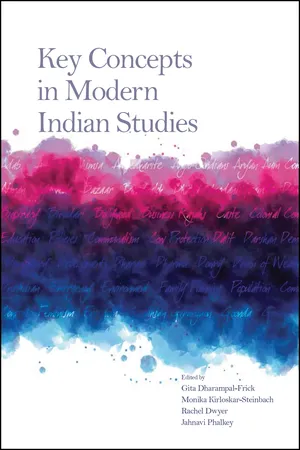
Key Concepts in Modern Indian Studies
- 350 pages
- English
- ePUB (mobile friendly)
- Available on iOS & Android
Key Concepts in Modern Indian Studies
About this book
Modern Indian studies have recently become a site for new, creative, and thought-provoking debates extending over a broad canvas of crucial issues. As a result of socio-political transformations, certain concepts—such as ahimsa, caste, darshan, and race—have taken on different meanings.
Bringing together ideas, issues, and debates salient to modern Indian studies, this volume charts the social, cultural, political, and economic processes at work in the Indian subcontinent. Authored by internationally recognized experts, this volume comprises over one hundred individual entries on concepts central to their respective fields of specialization, highlighting crucial issues and debates in a lucid and concise manner.
Each concept is accompanied by a critical analysis of its trajectory and a succinct discussion of its significance in the academic arena as well as in the public sphere. Enhancing the shared framework of understanding about the Indian subcontinent, Key Concepts in Modern Indian Studies will provide the reader with insights into vital debates about the region, underscoring the compelling issues emanating from colonialism and postcolonialism.
Tools to learn more effectively

Saving Books

Keyword Search

Annotating Text

Listen to it instead
Information
Bibliography
Table of contents
- Cover
- Half title
- Title
- Copyright
- Contents
- Introduction
- Adab
- Adivasi
- Ahimsa
- Ambedkarite
- Anglo-Indians
- Aryan
- Atman
- Ayurveda
- Bazaar
- Bhadralok/Bhadramahila
- Bhakti
- Bhoodan/Gramdan
- Biopiracy
- Biradari
- Bollywood
- Business Rajahs
- Caste
- Colonial (and Postcolonial) Education and Language Policies
- Communalism
- Cow Protection
- Dalit
- Darshan
- Democracy
- Development
- Dharavi
- Dharma in the Hindu Epics
- Dowry
- Drain of Wealth
- Dravidian
- Emergency
- Environment
- Family Planning/Population Control
- Feminism
- Freedom
- Gandhian
- Girangaon
- Goonda
- Green Revolution
- Hijra
- Hindi/Hindustani
- Hindu Reform Movements in British India
- Hindutva
- Imam
- Iman
- Indian Ocean
- Indian Philosophy
- Indian Uprising of 1857
- Integration
- Itihasa
- Izzat
- Kaliyuga
- Kashmiriyat
- Khadi
- Khalifa/Khalifat/Khilafat
- Khalistan
- Khandaan
- Knowledge Formation
- Kumbh Mela
- Land Revenue/Land Reform
- Language
- Liberalization
- Litigation
- Malabar
- Mandal Commission
- Manuvad
- Maoist Movement (Naxalites)
- Metro
- Middle Class
- Monsoon
- Mughal/Mughlai
- Muslim Religious Reform Movements
- Nationalism
- New Social Movements
- Nehruvian
- Nonalignment
- NRI
- Panchayati Raj
- Pandit
- Partition
- Plantation Labour
- Political Economy
- Postcolonialism
- Poverty
- Qawm
- Quit India Movement
- Race
- Radicalism
- Raj
- Religion
- Sahitya
- Samachar
- Samaj
- Samvad
- Sanskrit
- Science
- Secularism
- Self-Respect Movement
- Seven Sisters
- Strategic Enclave
- Subaltern
- Sufi
- Swadeshi
- Swaraj
- Theosophy
- Unani Medicine
- Vegetarianism
- Zenana
- Bibliography
- Note on Editors
Frequently asked questions
- Essential is ideal for learners and professionals who enjoy exploring a wide range of subjects. Access the Essential Library with 800,000+ trusted titles and best-sellers across business, personal growth, and the humanities. Includes unlimited reading time and Standard Read Aloud voice.
- Complete: Perfect for advanced learners and researchers needing full, unrestricted access. Unlock 1.4M+ books across hundreds of subjects, including academic and specialized titles. The Complete Plan also includes advanced features like Premium Read Aloud and Research Assistant.
Please note we cannot support devices running on iOS 13 and Android 7 or earlier. Learn more about using the app